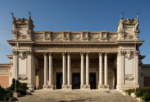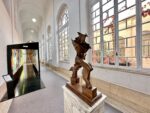Luca Bertolo – Le Belle Parole / The Beautiful Words
.jpg)
Quinta mostra personale dell’artista Luca Bertolo (1968, Milano, IT), nello spazio di Via Amati 13, Pistoia.
Comunicato stampa
SpazioA ha il piacere di presentare, sabato 23 settembre 2017, ore 18, Le Belle Parole / The Beautiful Words, quinta mostra personale dell’artista Luca Bertolo (1968, Milano, IT), nello spazio di Via Amati 13, Pistoia.
Il titolo della mostra è una possibile traduzione dell’espressione Ñe’’e Porã, che indica il tipo speciale di linguaggio utilizzato dagli sciamani Guarani per rivolgersi alle loro divinità. Queste Belle Parole o Grande Parlare richiedono un’estrema accuratezza e comportano un’enorme responsabilità. Solo prestando la massima attenzione alla forma dell’interrogazione (le orecchie degli dei sono molto sensibili!) si potrà sperare di ottenere una risposta alla domanda cruciale che gli indios Guarani si ripetono da generazioni: perché, pur sentendosi così simili ai loro dei, vivono ancora in un mondo impuro invece che nel yvy mara ey – la terra senza male?
“Le parole di questa mostra non sono necessariamente parole. Le opere esposte - alcuni quadri, una scritta luminosa, un video - formano una trama di rimandi incrociati. Se non è più possibile parlare in grande, si può, e forse si deve, riformulare il nostro linguaggio. Spargendo silenzi qua e là.” [Luca Bertolo, 2017]
In occasione della mostra sarà disponibile il catalogo Luca Bertolo (2012-2017) - Le Belle Parole / The Beautiful Words edito da Mousse Publishing con testi di Craig Burnett, Dieter Roelstraete e una conversazione tra l’artista e Antonio Grulli.
“Questa idea dell’eccesso di immagini nasce da un filosofo dogmatico come Feuerbach, ripresa dai situazionisti, in particolare da Guy Debord e divulgata da Susan Sontag nel suo libro sulla fotografia. Qui l’immagine è il negativo da combattere con la razionalità dei concetti. Ma ciò di cui parlano non sono immagini, bensì icone o segni visivi che rimandano a un nucleo simbolico, a un cliché. E quello che ci sommerge sono le icone commerciali, artistiche, giornalistiche, con tutto ciò che chiamiamo “prodotto”. L’immagine è un’altra cosa: è il lampo d’una apparizione che ci passa per la testa e ci lascia l’effetto d’una trasparenza del pensiero che stiamo inseguendo. In questo processo non c’è mai una netta separazione tra immagini e parole, ma neanche tra immagini e musica. I suoni e le parole producono visioni, che guidano il pensiero verso ciò che non sappiamo, ma a cui cerchiamo di dare un senso - il senso di qualcosa a cui credere.” [Gianni Celati, 2010]
Luca Bertolo (1968, Milano, IT) frequenta dal 1987 al 1992 il corso di laurea in Scienze dell’Informazione all’Università Statale di Milano dove comincia a scrivere una tesi di logica matematica. Nel frattempo segue altri corsi d’arte e lavora come illustratore. Dopo un soggiorno a Londra torna in Italia e nel 1998 si diploma all’Accademia di Belle Arti di Brera. Nello stesso anno si trasferisce a Berlino, dove vi risiede fino al 2005. Tra le mostre personali recenti segnaliamo: Se non qui dove (If not Here, Where?), organizzato da MAN, Gavoi, Ex Caserma, Nuoro, IT; Everybody is always right, Arcade, London, UK; If Anything, Marc Foxx Gallery, Los Angeles, USA; Guerre Pace, SpazioA, Pistoia IT; A Painting Cycle, a cura di Cecilia Canziani e Ilaria Gianni, Nomas Foundation, Roma, IT. Tra le mostre collettive recenti segnaliamo: Material Life, The Goma, Madrid, ES; Recto Verso, Fondazione Prada, Milano, IT Anna Barham , Luca Bertolo , John Wallbank, Galerie Tatjana Pieters, Gent, B; I baffi del bambino, a cura di Luca Bertolo, Lucie Fontaine, Milano, IT; Souvenir, curata da Lucie Fontaine, Galerie Perrotin, Paris, FR; Fig. 2: Natura Morta, curata da Cecilia Canziani e Ilaria Gianni, GNAM, Roma, IT. L’artista vive e lavora a Fabbiano, un piccolo borgo in Toscana.
1 Pierre Clastres, Le grand parler. Mythes et chants sacrés des Indiens Guarani, Paris, Edition du Seuil, Parigi 1974 [Trad. It.,. Il grande parlare. Miti e canti sacri degli Indiani Guaranì, Mimesis, Milano 2016].
Luca Bertolo
Le Belle Parole / The Beautiful Words
opening
September 23, 2017 - 6pm
untill : 11.11.17
Tue - Sat 11am - 2pm / 3pm- 7pm or by appointment
Press Release
SpazioA is proud to present, Saturday September 23, 2017, 6pm, Le Belle Parole / The Beautiful Words, fifth solo show of the artist Luca Bertolo (1968, Milano, IT), in Via Amati 13, Pistoia.
The Show’s title might work as a translation of Ñe’e Porã, the special language Guarani shamans adopt when addressing their gods. These Belle Parole/Beautiful Words or Grande Parlare1 (Talking Big) demand utmost accuracy and carry enormous responsibility. Only when we pay the closest attention to form we give to our questions (and gods have very good hearing!) may we hope to receive an answer to the crucial enigma Guarani native peoples have been faced with for generations: why on earth - despite feeling so similar to their gods – do they continue living in an impure world instead of “yvy mara ey”: the Land without Evil?
“Of course, the words in this show are not necessarily words. The works presented – a few paintings, a neon sign, a video – are a plotting of cross references. If thinking big and talking big is no longer possible, we can, perhaps must, reformulate our language, scattering silence here and there.” [Luca Bertolo, 2017]
The catalog Luca Bertolo (2012-2017) - Le Belle Parole / The Beautiful Words, published by Mousse publishing, with texts by Craig Burnett, Dieter Roelstraete and a coversation between the artist and Antonio Grulli, will be available at the show.
“This idea of “excess of image” derives from dogmatic philosophers, Feuerbach, for example, is further developed by Situationists, Guy Debord, in particular, and popularized by Susan Sontag in her book on photography. Here, the image is the negative that must be countered with the rationality of concepts. What they refer to as images are really instead icons or visual signs that evoke a symbolic nucleus, a cliché. And the excess in which we are drowning consists of the commercial, artistic, and journalistic icons associated with everything we call “product”. An image is something else: the flash of an appearance that streaks through our mind, leaving behind the effect of a transparency of the thought we are pursuing. Sharp distinctions between image and word are never made in this process, however, or either between image and music, for that matter. Sounds and words both produce visions, which guide our thoughts in the direction of the unknown to which we attempt to assign a meaning - the meaning of something we can believe in.” [Gianni Celati, 2010]
Luca Bertolo (1968, Milano, IT) attended the Graduate Degree Course in Information Technology from 1987 until 1992 at Milano Università Statale, where he began writing his thesis on Mathematical Logic while taking other courses in art and working as an illustrator. Following a period of residence in London, he returned to Italy and graduated from the Brera Fine Arts Academy in 1998.
He moved to Berlin the same year, where he lived until 2005. Recent solo shows include: Se non qui dove (If not Here, Where?), organized by MAN, Gavoi, Ex Caserma, Nuoro, IT; Everybody is always right, Arcade, London, UK; If Anything, Marc Foxx Gallery, Los Angeles, USA; Guerre Pace, SpazioA, Pistoia IT; A Painting Cycle, curated by Cecilia Canziani and Ilaria Gianni, Nomas Foundation, Roma, IT. Recent group exhibitions include: Material Life, The Goma, Madrid, ES; Recto Verso, Fondazione Prada, Milano, IT; Anna Barham , Luca Bertolo , John Wallbank, Galerie Tatjana Pieters, Gent, B; I baffi del bambino, curated by Luca Bertolo, Lucie Fontaine, Milano, IT; Souvenir, curated by Lucie Fontaine, Galerie Perrotin, Paris, FR; Fig. 2: Natura Morta, curated by Cecilia Canziani and Ilaria Gianni, GNAM, Roma, IT. The artist lives and works in Fabbiano, a small village in Tuscany.



